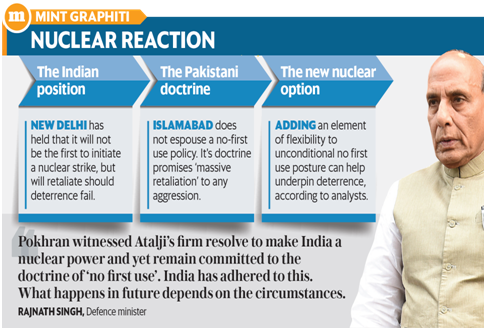

Rajnath Singh's remarks on 'No First Use' of nukes indicate ambiguity in nuclear policy in India's interest.
Context
Rajnath Singh's remarks on 'No First Use' of nukes indicate ambiguity in nuclear policy in India's interest.

About
- The defense minister suggested that India's NFU policy on nuclear weapons is not a binding commitment for the future despite strict adherence in the past. In other words, he made a deliberate attempt to interject some ambiguity into the doctrine.
- The NFU doctrine on nuclear weapons is a formal declaration that India will exercise its nuclear option only if it suffers an atomic detonation by an adversary.
- It shall never be the first one to use nuclear warheads in a conflict and given the fact that nukes are not used during peacetime, it essentially signifies that India shall not exercise that option even in grave crisis, fog of war, despite being apprehensive of an imminent nuclear attack from an adversary.
Main Features of India's Nuclear Doctrine
- Building and maintaining a credible minimum deterrent.
- A "No First Use" posture; nuclear weapons to be used only "in retaliation against a nuclear attack on Indian territory or on Indian forces anywhere".
- Nuclear retaliation to a first strike will be "massive" and designed to inflict "unacceptable damage".
- Nuclear retaliatory attacks to be authorized only by civilian political leadership through the Nuclear Command Authority.
- Non use of nuclear weapons against non nuclear weapon states.
- Continuance of strict controls on export of nuclear and missile related materials and technologies, participation in FMCT negotiations, continued moratorium on testing.
- India to retain option of retaliating with nuclear weapons in the event of a major attack against it with biological or chemical weapons.
- Continued commitment to goal of nuclear weapon free world, through global, verifiable and non discriminatory disarmament.
"Credible minimum deterrent":
It recognizes that the deterrence to be effective must be credible, which includes:
- Sufficient and Survivable nuclear forces both in terms of warheads and means of delivery able to inflict unacceptable damage.
- Nuclear Forces must be operationally prepared at all times.
- Effective Intelligence and Early Warning Capabilities.
- A Robust Command and Control System.
- The Will to Employ Nuclear Forces.
- Communication of Deterrence Capability.
Credible minimum deterrence along with "No first use" and "No use against non nuclear states" clearly indicates that India's nuclear capability is for defensive purpose.


